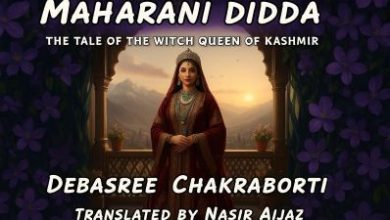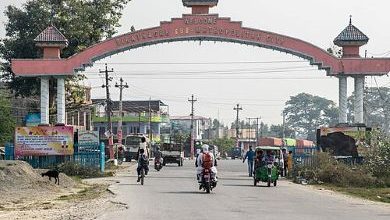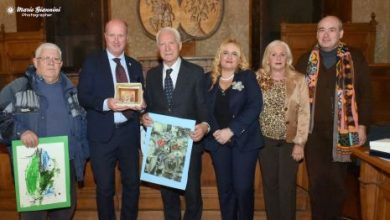
Noila had learned how to draw a fish. It was so easy: just two curved lines crossing each other, then the tail, the mouth, and finally the eyes. After that, she drew fish after fish
Lobar Rustamova
Na’im’s sister Noila had learned how to draw a fish. It was so easy: just two curved lines crossing each other, then the tail, the mouth, and finally the eyes. After that, she drew fish after fish… Soon her drawings even looked better than her sister’s.
That day, while Na’im was just starting lunch with his grandmother, their neighbor Rasul burst in excitedly.
“Come on, let’s go fishing. My dad already left,” he said, hurrying his friend.
Na’im’s eyes sparkled with joy. At last, he would see a real, living fish! How wonderful that would be!
“Grandma! I’ll be back soon!”
Without waiting for an answer, he ran outside.
“Hooray for fishing!” He danced to the rhythm of Rasul’s whistling tune, gazing with delight at the birds filling the blue sky with their flight. Ahead of the boys walked Rasul’s father, Toshtemir aka. His imposing figure seemed even more dignified to Na’im in that moment.
“Hey, Rasul,” Na’im nudged his friend. “How many do you think we’ll catch?”
Rasul stretched out both hands.
“This many. No, even bigger than today!”
“Wow! But what if the guards catch us?”
“My dad knows the best spot. He says even the king of fish lives there!”
Finally, they arrived. At the edge of the lake, surrounded by reeds, they stopped. The sun’s diamond rays danced on the water’s surface. From time to time, flocks of birds swooped down, dipped their beaks into the water, and soared back into the sky.
“Be careful, boys,” said Toshtemir aka. “This part here is swampy.”
Na’im’s heart shrank a little, so he sat farther away, on the grass, waiting for the fishing rods to be cast. But Toshtemir aka didn’t take out a rod. Instead, with a small iron hammer, he broke through the ice, making a hole big enough to fit a bowl. In no time, a fish leapt out and flopped onto the ice. Its scales glittered in the sunlight.
“Look, it’s dancing!” Rasul called Na’im. “Don’t be scared, come closer. Look!”
Na’im joined his friend and laughed heartily. He was grateful to Rasul for bringing him to such a sight, and he smiled in delight. But after a moment, the fish opened its mouth and grew still.
“Why isn’t it moving anymore?” Na’im asked anxiously.
“It died!”
“Why did it die?” The joy on Na’im’s face was replaced with sorrow.
“Fish die without water,” Rasul said, grabbing the fish and tossing it into a bucket.
“If you knew it would die, why didn’t you put it back in the water?” Na’im’s eyes grew moist.
“You’re funny,” Rasul answered carelessly.
“If I put it back, what would we cook?”
Na’im lost all interest in seeing fish. The ice was soon covered with large and small fish.
“There it is,” he thought, “so happy to have come into the light, leaping and dancing… but once it realizes it’s been deceived, it grows still. Its eyes—those eyes look up at us, pleading, full of sorrow…”
Na’im struggled to hold back his tears as he looked into the eyes of the fish dropping into the bucket. Suddenly, he remembered the little finch they had buried in the corner of the yard a month ago. He had caught it and locked it in a cage. But the finch neither ate nor drank. It chirped and chirped, then the next day it died. Its eyes had looked just like those of the fish now—so sorrowful, as if saying, “What have you done to me? I wanted to live, I wanted to fly…” After burying it, he had cried a lot. After all, hadn’t his grandmother told him, “Let it go,” but he had insisted, “I’ll keep it, I’ll show it to my friends!”
“Look! Hey, see how many we’ve got?” Rasul shook his friend’s shoulder. “One whole bucket! At times like this, you can catch loads. My dad knows the right spot!”
Rasul started tossing the fish into a second bucket.
“Today Dad’s coworkers are coming over. They asked for fried fish. Nobody can catch them like my dad anyway.”
He glanced proudly at his father.
Na’im looked at Rasul’s hands, red from the cold, then at his eyes, sparkling with joy.
“Let the small ones go…” he said, pointing at the tiny fish that were still flicking their tails.
“What? You’re strange, seriously! I always eat the little ones—they don’t have bones. You’ll see when you try them!” Rasul replied.
Na’im glanced at the filling second bucket. Beady-eyed little fish stared blankly. They would never live again, never swim happily in the clear water, and never lift their heads to see the sky or the reeds. Instead, they would be tossed into hot oil to fry…
No! His heart ached. “Poor little fish…”
Then he looked at Toshtemir aka, who had rolled up his trouser legs and was humming to himself. To Na’im, he suddenly looked terribly cruel.
“Come on, come closer! Yes, jump! There you go!” Toshtemir aka struck a leaping fish with his hand, knocking it onto the ice, then burst into loud laughter.
“Throw that creature into the bucket—it’s nice and fat. Look at that, half a kilo at least! Must be the mother!”
Na’im almost burst into tears. “If it’s the mother, what will her babies do now? How will they find food? They’ll die too!”
He snatched the fish from Rasul’s hands and quickly dropped it back into the water through the hole. A faint lightness spread through his chest.
“What do you think you’re doing, Na’im-boy?” Toshtemir aka shouted angrily.
“I don’t want it to die! Its babies will go hungry…”
“Ha! You softhearted kid! Fish aren’t like humans who nurse their young. As soon as they hatch, they fend for themselves. Listen, I’ll tell you—every good thing in this world was created for man. Do you understand? If we don’t eat them all, they’ll multiply and take over everything. There won’t even be space left for people.”
Toshtemir looked at his son as if to confirm his wise words, with a glance that seemed to say: “That’s how it is, you understand now, don’t you?”
But in the boy’s eyes, instead of trust, he saw a flame of hatred.
“So hurt, are you? I must look like a bad man to you now…” he said, and turned to his son.
“He doesn’t know how sweet that fish would taste, Dad. I’ll cook it for him myself, all right?”
Na’im flared up: “I won’t eat it!”
He hurried away along the narrow path they had come by.
“What an extraordinary boy, your friend,” Toshtemir said as he watched Na’im walk farther and farther away. “Pack up. Let’s go. Don’t let him wander off and get lost…”
The silken cover of evening spread over the reeds and trees by the lake. The moonlight glittered on the surface, making the lake seem even more alluring and magical the farther they went. But Na’im paid no attention; in his mind, fish crawled along, their mouths opening in lament: “Merciless, merciless…”
He muttered under his breath, wiping away the endless stream of tears on his face. A few steps behind him walked Rasul and his father.
By the time they entered the village, night had already fallen, and the lights in the houses glowed brightly. His grandmother was sitting on the bench near the doorway. After Toshtemir exchanged greetings with the old woman, he said to his son:
“Pay your friend what you owe him!”
“No need!”
“Well then, come to our place. I’ll fry it so well you’ll realize you were upset for nothing, and you’ll want to go back yourself.”
A shiver ran through Na’im.
“No! I’ll never eat it! I hate you… You have no mercy… Ugh!”
Crying, he ran into the house. He lay for a long time staring at the starry sky, and then he fell asleep.
He had such a terrifying dream… Tiny, frail fish had come ashore.
“…What did you do to our mother? Didn’t you pity us? We were only born yesterday. We can’t swim yet. Our mother went to look for food. Our bellies are aching with hunger. What will we do now? What will we do? Give us bread! Bread! Bread!!!”
Na’im woke with a start and burst into tears.
“What’s wrong, my little lamb?” his grandmother stroked his head.
“A dream… in my dream they… they were dying…” Na’im sobbed.
“Don’t cry,” his grandmother understood at once. “They won’t die. They too have their own share of sustenance. If they’ve come into this world, they’ll live. Don’t hurt them, all right? It’s a sin. Those who want to add sins, let them go on hurting creatures. But you—protect them from the wicked. That will be your good deed…”
Na’im hugged his grandmother’s neck tightly:
“I’ll never go back there again!” he said.
The warm, white rays of dawn poured into the room, caressing the boy’s face, playing in his hair.
________________
FEAR
Snow was falling… Soft, pure snow… Each flake drifted down like a white wish, gently covering the face of the earth. The trees, long longing for winter, were already dressed in their snowy coats. Except for the occasional birds flitting by in search of a stray seed, the whole earth, all of existence, seemed to have fallen into a deep, peaceful sleep…
Nodirjon was watching the snowfall from behind the window, lost in thoughts of his father. Tonight was New Year’s Eve. What kind of gift could he give his father?
His father had brought home a tall pine tree. They had decorated it with ornaments, even strung it with twinkling lights. They had set the table too, but… Nodirjon sighed. If only Mom were here… Everything would’ve been different.
Their home used to be filled with laughter, neatness, warm meals… She used to dress Nodirjon herself, kiss him on the cheeks and forehead before sending him off to kindergarten. His mother had been the most beautiful of all mothers. She had never once raised her hand to him.
Then his little sister, Yodgora, was born — and his mother passed away…
Since then, his father’s face had lost all joy. Cooking, cleaning, doing laundry — all of it had fallen onto his shoulders.
Last year, a new “mom” came into their lives. Nodirjon hadn’t liked her. One day, she had pulled Yodgora by the hair and slapped her face. Nodirjon had kicked her out of the house. Not even his father’s shouts of “Hey! Stop!” could hold him back.
Well, of course! Why would anyone hit his little sister? Their mother had died — given her life — to bring Yodgora into this world. And now a stranger, just because she cuts paper and calls herself “your mother,” thinks she can strike his sister?
What kind of justice is that?
Nodirjon quietly tiptoed toward his little sister’s bed. She was sleeping soundly, a doll clutched in her arms. In the kitchen… his father was stirring something on the stove.
— “Hey, son, are you hungry?” his father asked. “Dinner will be ready soon.”
Instead of answering, the boy simply looked at his father. There was a quiet sadness in his eyes. Somehow, in that moment, his father seemed older. There were lines on his forehead now, and strands of gray threading through his hair.
Then suddenly, tears threatening to fall, Nodirjon turned and walked outside. He held out his hands to the falling snowflakes. Countless tiny stars landed in his small palms, only to melt instantly — and new ones would take their place. These delicate stars drifting through the air didn’t sting his eyes. On the contrary, they lit up his heart with a quiet, boundless joy…
Wiping the dampness from his face, Nodirjon came back inside. He remembered the conversation he’d had with his father a few days earlier:
— “Son, you’re in school now. You’ve grown — you’re a smart boy. Your sister cries for her ‘mama’ every day. What would you say if we brought a mother into our home? I’m at work all day, I can’t manage everything around the house anymore… Please try to understand me…”
But Nodirjon had stood his ground.
— “No. Never. I don’t need any other mother!”
Later, his father brought the new woman over.
Nodirjon didn’t know her. She lived at the end of their street, in the house with the blue gate. Her name was Muhabbat. She worked at the daycare and looked after Yodgora. They said she had no children of her own. Yodgora seemed happy around her — clinging to her like she belonged. But Nodir…
— “Nodirjon, how are you?”
Muhabbat had hugged him, held him close. He squirmed away, ran to his room, and locked the door from the inside. The woman had left… and Yodgora cried.
Even when his father knocked and said,
— “Open the door, son,”
He wouldn’t open it.
— “You didn’t do the right thing,” his father said through the door.
— “Just as much as you love your mother, I loved her too… But there’s nothing we can do. It was fate. We need a woman in this house, son. At least think of your sister…”
It had been more than a month since that day.
Now, standing quietly in thought, Nodirjon felt a sudden spark of joy. He had come to a decision — he finally knew what he could do to make his sister and his father happy:
“Our literature teacher talked about the qorxat — the snow wish… People write them down… I’ll write one too.”
“I’ll invite Muhabbat aya for New Year.”
He quickly pulled a notebook and pen from his schoolbag and began to write:
“Dear Mom! Please forgive me! You must come to our house today — we’ll all be so happy: my little sister, my dad, and me. If you don’t come, I’ll be very sad…
Yours truly,
Nodirjon the Snow-Wish Writer.”
— “What are you doing out in this cold? Is everything all right?” the woman asked, her voice full of concern.
— “I just… I brought you a letter,” Nodirjon replied quietly.
Inside, his father called out from the kitchen:
— “Come on, you two — dinner’s ready. If we don’t hurry, the New Year might just leave without us!”
The table was full of food… and the sweets — oh, the sweets! Yodgora, always the sweet-tooth, couldn’t stop bouncing with excitement, pointing to one treat after another, begging her father to hand her this one, then that one.
But Nodirjon’s mind was elsewhere — outside. He imagined the joy on his father’s face… and his sister’s wide, sparkling eyes… His heart swelled at the thought.
Just then, there was a knock at the door.
Nodirjon pretended not to notice. His father got up and opened it.
There she stood — Muhabbat Aya — her coat and scarf dusted with snow.
— “I… Nodirjon told me… Happy New Year,” she said softly.
His father hesitated, surprised, then managed to say:
— “Please, come in…”
Yodgora nearly took flight with joy.
— “Mommy’s here! Mommy’s here!”
The woman bent down and hugged the little girl tightly. Yodgora wrapped her arms around her neck and wouldn’t let go, whispering over and over:
— “You’re not leaving, right? You’ll stay with us, won’t you?”
Snow kept falling…
But it wasn’t just snow anymore — it was as if kindness, love, and happiness were softly drifting down from the sky, wrapping the world — and their hearts — in pure, quiet joy.
Read: Wrong Step – A Short Story from Uzbekistan
___________________
 Lobar Rustamova is Member of the Writers’ Union of Uzbekistan.
Lobar Rustamova is Member of the Writers’ Union of Uzbekistan.




